The Cambridge History of China. Vol. 12: Republican China, 1912-1949, Part 1
Подождите немного. Документ загружается.

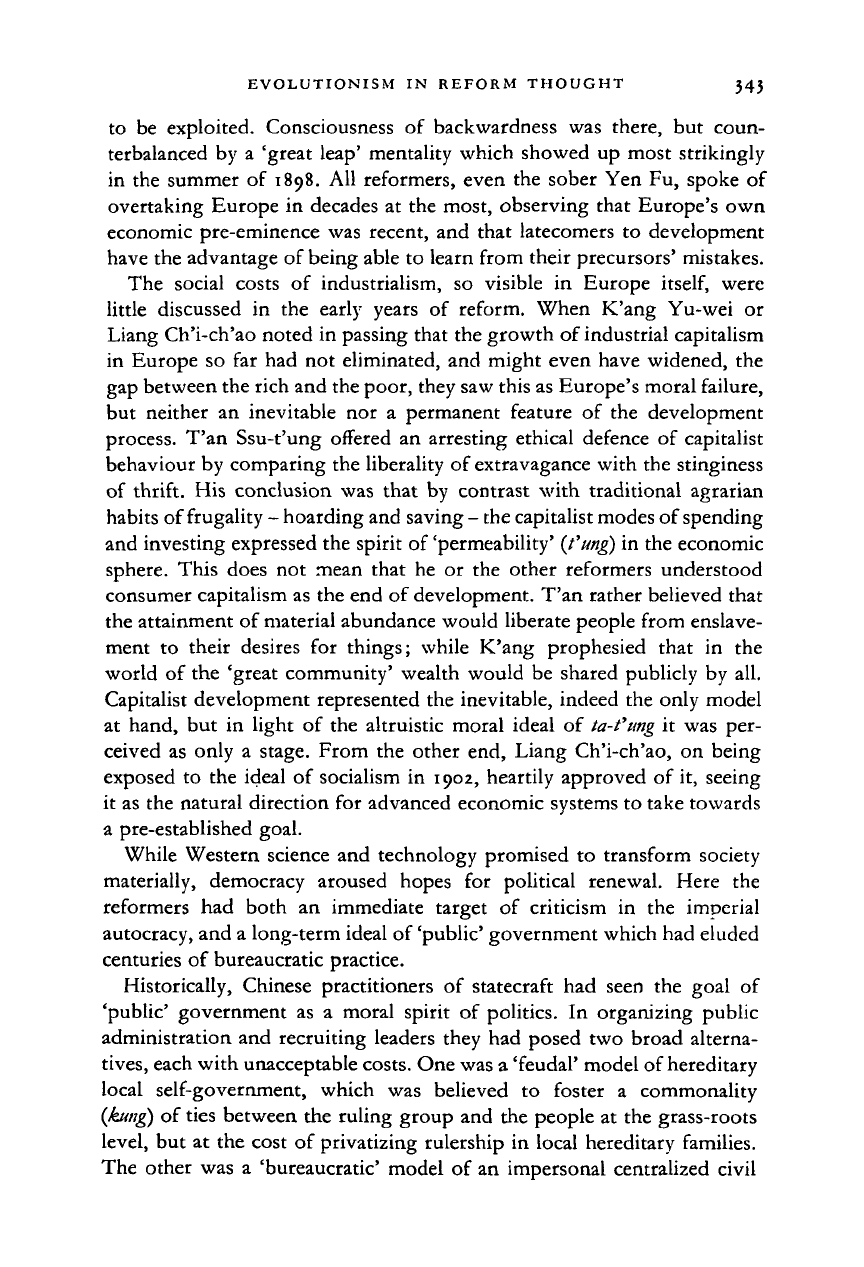
EVOLUTIONISM IN REFORM THOUGHT 343
to be exploited. Consciousness of backwardness was there, but coun-
terbalanced by a 'great leap' mentality which showed up most strikingly
in the summer of 1898. All reformers, even the sober Yen Fu, spoke of
overtaking Europe in decades at the most, observing that Europe's own
economic pre-eminence was recent, and that latecomers to development
have the advantage of being able to learn from their precursors' mistakes.
The social costs of industrialism, so visible in Europe
itself,
were
little discussed in the early years of reform. When K'ang Yu-wei or
Liang Ch'i-ch'ao noted in passing that the growth of industrial capitalism
in Europe so far had not eliminated, and might even have widened, the
gap between the rich and the poor, they saw this as Europe's moral failure,
but neither an inevitable nor a permanent feature of the development
process. T'an Ssu-t'ung offered an arresting ethical defence of capitalist
behaviour by comparing the liberality of extravagance with the stinginess
of thrift. His conclusion was that by contrast with traditional agrarian
habits of frugality - hoarding and saving - the capitalist modes of spending
and investing expressed the spirit of 'permeability'
(t'ung)
in the economic
sphere. This does not mean that he or the other reformers understood
consumer capitalism as the end of development. T'an rather believed that
the attainment of material abundance would liberate people from enslave-
ment to their desires for things; while K'ang prophesied that in the
world of the 'great community' wealth would be shared publicly by all.
Capitalist development represented the inevitable, indeed the only model
at hand, but in light of the altruistic moral ideal of
ta-t'ung
it was per-
ceived as only a stage. From the other end, Liang Ch'i-ch'ao, on being
exposed to the ideal of socialism in 1902, heartily approved of it, seeing
it as the natural direction for advanced economic systems to take towards
a pre-established goal.
While Western science and technology promised to transform society
materially, democracy aroused hopes for political renewal. Here the
reformers had both an immediate target of criticism in the imperial
autocracy, and a long-term ideal of 'public' government which had eluded
centuries of bureaucratic practice.
Historically, Chinese practitioners of statecraft had seen the goal of
'public' government as a moral spirit of politics. In organizing public
administration and recruiting leaders they had posed two broad alterna-
tives,
each with unacceptable costs. One was a 'feudal' model of hereditary
local self-government, which was believed to foster a commonality
{kung)
of ties between the ruling group and the people at the grass-roots
level, but at the cost of privatizing rulership in local hereditary families.
The other was a 'bureaucratic' model of an impersonal centralized civil
Cambridge Histories Online © Cambridge University Press, 2008
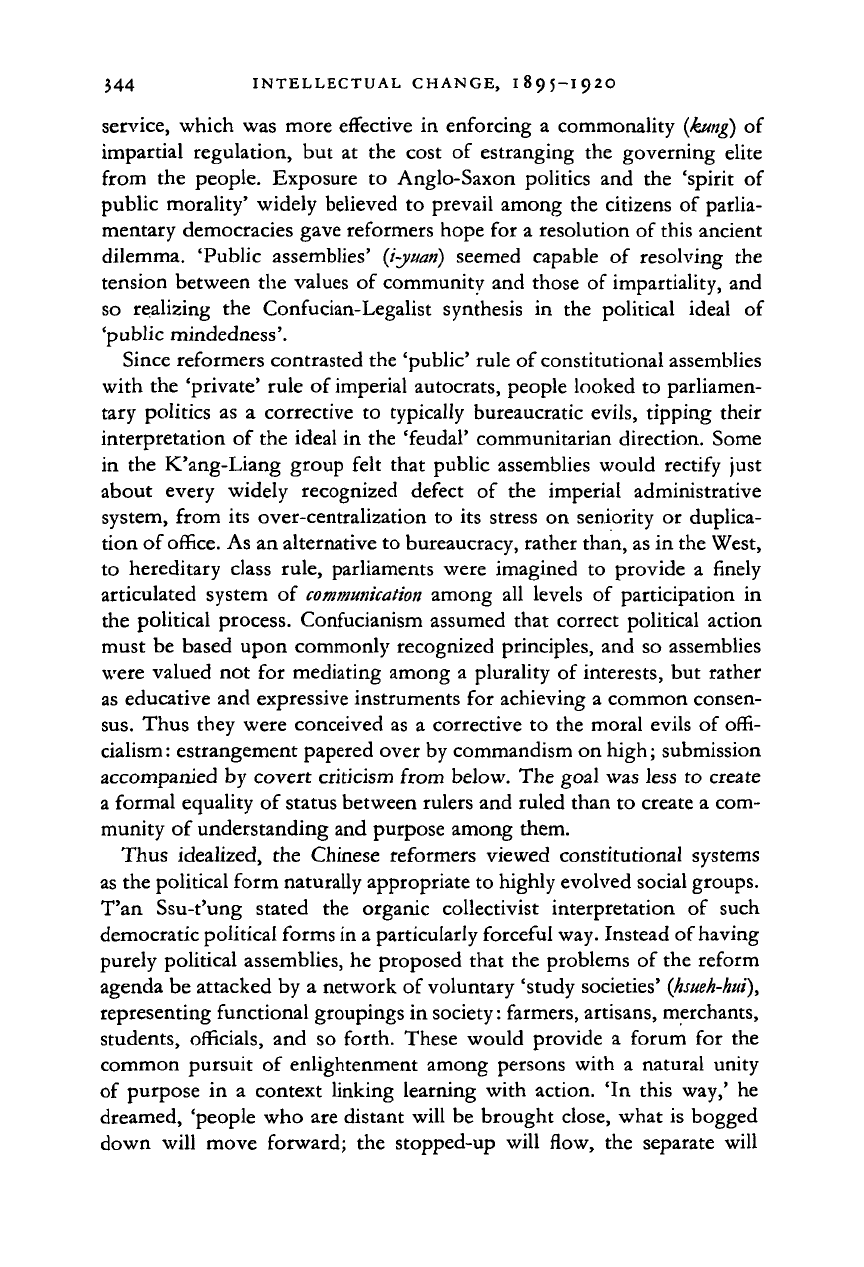
344 INTELLECTUAL CHANGE, 1895-1920
service, which was more effective
in
enforcing
a
commonality (kung)
of
impartial regulation, but
at the
cost
of
estranging
the
governing elite
from
the
people. Exposure
to
Anglo-Saxon politics and
the
'spirit
of
public morality' widely believed
to
prevail among the citizens
of
parlia-
mentary democracies gave reformers hope for a resolution of this ancient
dilemma. 'Public assemblies'
(i-yuari)
seemed capable
of
resolving
the
tension between the values
of
community and those of impartiality, and
so realizing
the
Confucian-Legalist synthesis
in the
political ideal
of
'public mindedness'.
Since reformers contrasted the 'public' rule of constitutional assemblies
with the 'private' rule of imperial autocrats, people looked to parliamen-
tary politics
as a
corrective
to
typically bureaucratic evils, tipping their
interpretation
of
the ideal in the 'feudal' communitarian direction. Some
in the K'ang-Liang group felt that public assemblies would rectify just
about every widely recognized defect
of the
imperial administrative
system, from its over-centralization
to
its stress on seniority
or
duplica-
tion of office. As an alternative to bureaucracy, rather than, as in the West,
to hereditary class rule, parliaments were imagined
to
provide
a
finely
articulated system
of
communication
among
all
levels
of
participation
in
the political process. Confucianism assumed that correct political action
must be based upon commonly recognized principles, and so assemblies
were valued not
for
mediating among
a
plurality of interests, but rather
as educative and expressive instruments for achieving
a
common consen-
sus.
Thus they were conceived as
a
corrective
to
the moral evils
of
offi-
cialism
:
estrangement papered over by commandism on high; submission
accompanied by covert criticism from below. The goal was less to create
a formal equality of status between rulers and ruled than to create
a
com-
munity of understanding and purpose among them.
Thus idealized,
the
Chinese reformers viewed constitutional systems
as the political form naturally appropriate to highly evolved social groups.
T'an Ssu-t'ung stated
the
organic collectivist interpretation
of
such
democratic political forms in a particularly forceful way. Instead of having
purely political assemblies, he proposed that the problems
of
the reform
agenda be attacked by
a
network of voluntary 'study societies'
(hsueh-hui),
representing functional groupings in society: farmers, artisans, merchants,
students, officials, and
so
forth. These would provide
a
forum
for
the
common pursuit
of
enlightenment among persons with
a
natural unity
of purpose
in a
context linking learning with action.
'In
this way,'
he
dreamed, 'people who are distant will be brought close, what is bogged
down will move forward;
the
stopped-up will flow,
the
separate will
Cambridge Histories Online © Cambridge University Press, 2008
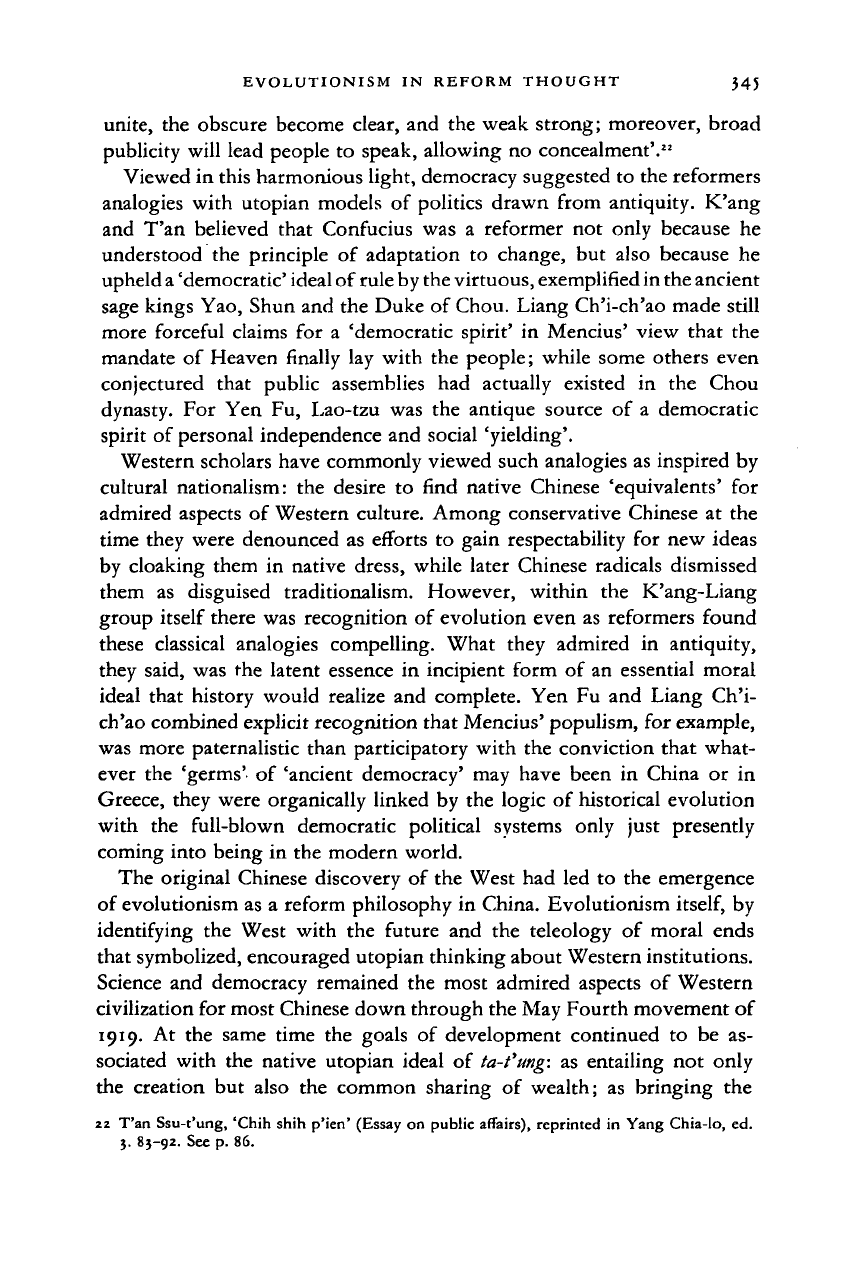
EVOLUTIONISM IN REFORM THOUGHT 345
unite, the obscure become clear, and the weak strong; moreover, broad
publicity will lead people to speak, allowing no concealment'.
22
Viewed in this harmonious light, democracy suggested to the reformers
analogies with Utopian models of politics drawn from antiquity. K'ang
and T'an believed that Confucius was a reformer not only because he
understood the principle of adaptation to change, but also because he
upheld
a
'democratic' ideal of rule by the virtuous, exemplified in the ancient
sage kings Yao, Shun and the Duke of Chou. Liang Ch'i-ch'ao made still
more forceful claims for a 'democratic spirit' in Mencius' view that the
mandate of Heaven finally lay with the people; while some others even
conjectured that public assemblies had actually existed in the Chou
dynasty. For Yen Fu, Lao-tzu was the antique source of a democratic
spirit of personal independence and social 'yielding'.
Western scholars have commonly viewed such analogies as inspired by
cultural nationalism: the desire to find native Chinese 'equivalents' for
admired aspects of Western culture. Among conservative Chinese at the
time they were denounced as efforts to gain respectability for new ideas
by cloaking them in native dress, while later Chinese radicals dismissed
them as disguised traditionalism. However, within the K'ang-Liang
group itself there was recognition of evolution even as reformers found
these classical analogies compelling. What they admired in antiquity,
they said, was the latent essence in incipient form of an essential moral
ideal that history would realize and complete. Yen Fu and Liang Ch'i-
ch'ao combined explicit recognition that Mencius' populism, for example,
was more paternalistic than participatory with the conviction that what-
ever the 'germs'- of 'ancient democracy' may have been in China or in
Greece, they were organically linked by the logic of historical evolution
with the full-blown democratic political systems only just presently
coming into being in the modern world.
The original Chinese discovery of the West had led to the emergence
of evolutionism as a reform philosophy in China. Evolutionism
itself,
by
identifying the West with the future and the teleology of moral ends
that symbolized, encouraged Utopian thinking about Western institutions.
Science and democracy remained the most admired aspects of Western
civilization for most Chinese down through the May Fourth movement of
1919.
At the same time the goals of development continued to be as-
sociated with the native Utopian ideal of
ta-t'ung:
as entailing not only
the creation but also the common sharing of wealth; as bringing the
22 T'an Ssu-t'ung, 'Chih shih p'ien' (Essay on public affairs), reprinted in Yang Chia-lo, ed.
j.
83-92. See p. 86.
Cambridge Histories Online © Cambridge University Press, 2008
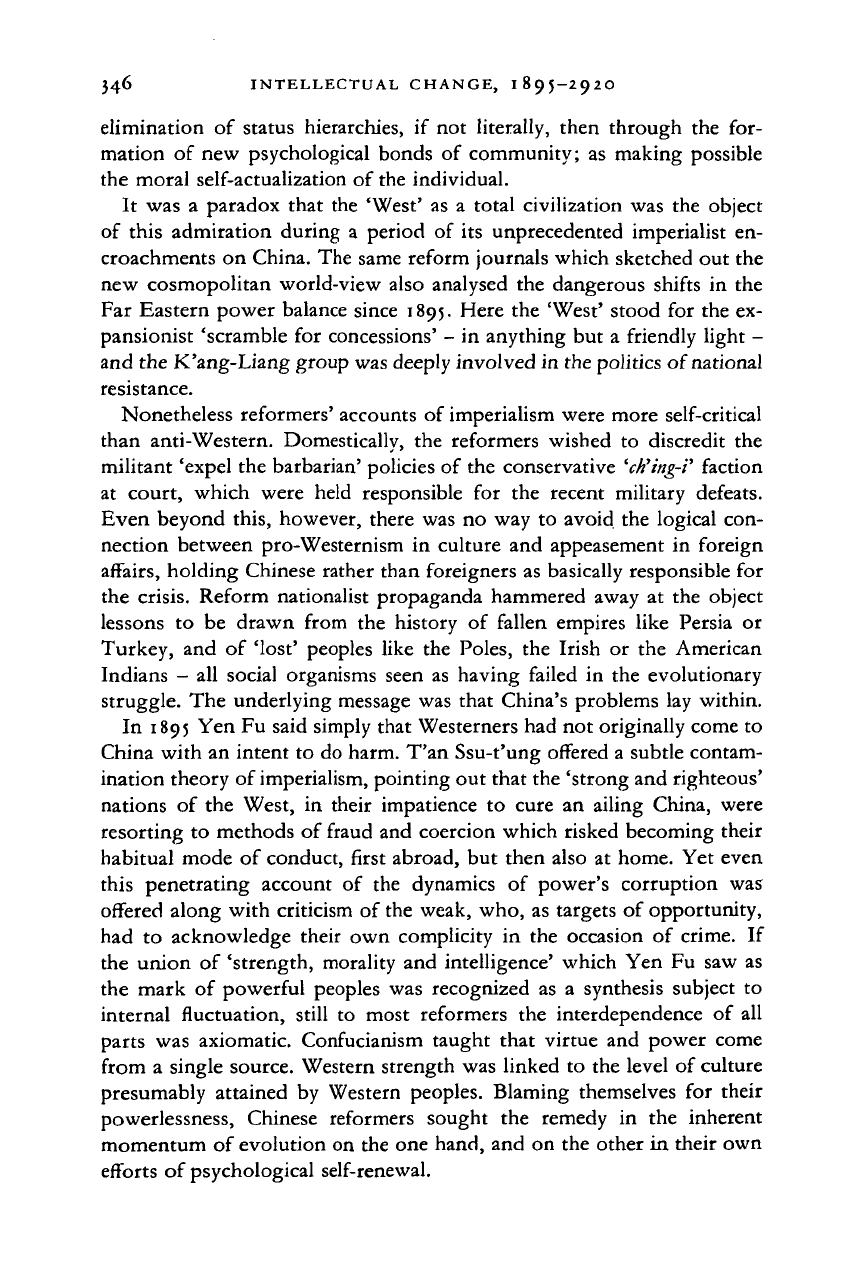
346 INTELLECTUAL CHANGE, 1895-292O
elimination
of
status hierarchies,
if
not literally, then through the
for-
mation
of
new psychological bonds
of
community; as making possible
the moral self-actualization of the individual.
It was
a
paradox that the 'West' as
a
total civilization was the object
of this admiration during
a
period
of
its unprecedented imperialist en-
croachments on China. The same reform journals which sketched out the
new cosmopolitan world-view also analysed the dangerous shifts
in
the
Far Eastern power balance since 1895. Here the 'West' stood for the ex-
pansionist 'scramble for concessions'
-
in anything but
a
friendly light
-
and the K'ang-Liang group was deeply involved in the politics of national
resistance.
Nonetheless reformers' accounts of imperialism were more self-critical
than anti-Western. Domestically, the reformers wished
to
discredit the
militant 'expel the barbarian' policies
of
the conservative
'c/i'ing-i'
faction
at court, which were held responsible
for the
recent military defeats.
Even beyond this, however, there was no way to avoid the logical con-
nection between pro-Westernism
in
culture and appeasement
in
foreign
affairs, holding Chinese rather than foreigners as basically responsible for
the crisis. Reform nationalist propaganda hammered away
at
the object
lessons
to be
drawn from the history
of
fallen empires like Persia
or
Turkey, and
of
'lost' peoples like the Poles, the Irish
or
the American
Indians
-
all social organisms seen as having failed
in
the evolutionary
struggle. The underlying message was that China's problems lay within.
In 1895 Yen Fu said simply that Westerners had not originally come to
China with an intent to do harm. T'an Ssu-t'ung offered a subtle contam-
ination theory of imperialism, pointing out that the 'strong and righteous'
nations
of
the West,
in
their impatience
to
cure
an
ailing China, were
resorting to methods of fraud and coercion which risked becoming their
habitual mode of conduct, first abroad, but then also at home. Yet even
this penetrating account
of
the dynamics
of
power's corruption was
offered along with criticism of the weak, who, as targets of opportunity,
had
to
acknowledge their own complicity
in
the occasion
of
crime.
If
the union
of
'strength, morality and intelligence' which Yen Fu saw as
the mark
of
powerful peoples was recognized
as a
synthesis subject
to
internal fluctuation, still
to
most reformers the interdependence
of
all
parts was axiomatic. Confucianism taught that virtue and power come
from
a
single source. Western strength was linked to the level of culture
presumably attained
by
Western peoples. Blaming themselves
for
their
powerlessness, Chinese reformers sought
the
remedy
in the
inherent
momentum of evolution on the one hand, and on the other in their own
efforts of psychological self-renewal.
Cambridge Histories Online © Cambridge University Press, 2008
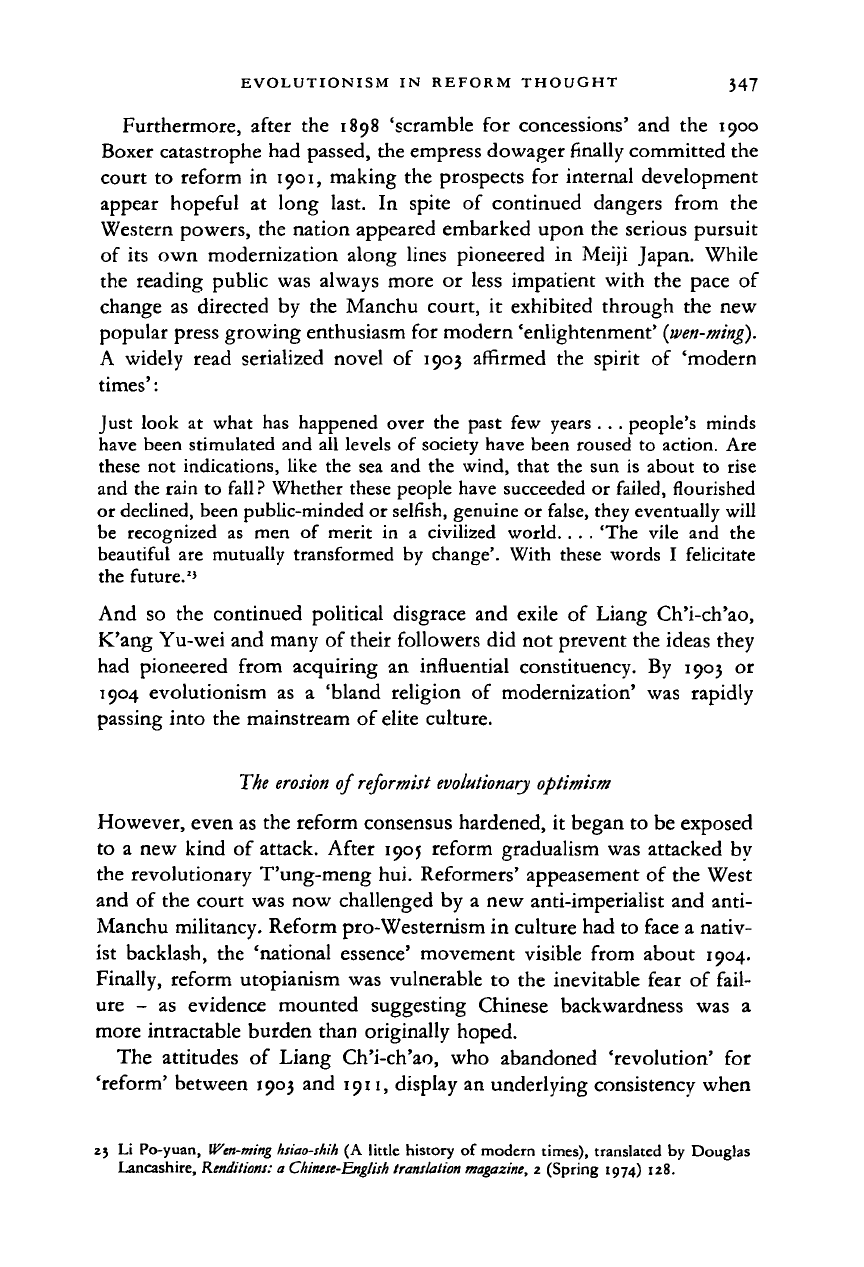
EVOLUTIONISM IN REFORM THOUGHT 347
Furthermore, after
the
1898 'scramble
for
concessions'
and the
1900
Boxer catastrophe had passed, the empress dowager finally committed the
court
to
reform
in
1901, making the prospects
for
internal development
appear hopeful
at
long last.
In
spite
of
continued dangers from
the
Western powers, the nation appeared embarked upon the serious pursuit
of its own modernization along lines pioneered
in
Meiji Japan. While
the reading public was always more
or
less impatient with the pace
of
change
as
directed
by the
Manchu court,
it
exhibited through the new
popular press growing enthusiasm for modern 'enlightenment'
(wen-ming).
A widely read serialized novel
of
1903 affirmed
the
spirit
of
'modern
times':
Just look
at
what has happened over the past few years .
.
. people's minds
have been stimulated and all levels of society have been roused to action. Are
these not indications, like the sea and the wind, that the sun is about
to
rise
and the rain to fall? Whether these people have succeeded or failed, flourished
or declined, been public-minded or selfish, genuine or false, they eventually will
be recognized
as
men
of
merit
in a
civilized world. .
.
. 'The vile
and the
beautiful are mutually transformed
by
change'. With these words
I
felicitate
the future.
2
'
And
so the
continued political disgrace and exile
of
Liang Ch'i-ch'ao,
K'ang Yu-wei and many of their followers did not prevent the ideas they
had pioneered from acquiring
an
influential constituency.
By
1903
or
1904 evolutionism
as a
'bland religion
of
modernization'
was
rapidly
passing into the mainstream of elite culture.
The
erosion
of reformist
evolutionary
optimism
However, even as the reform consensus hardened,
it
began to be exposed
to
a
new kind
of
attack. After 1905 reform gradualism was attacked
by
the revolutionary T'ung-meng hui. Reformers' appeasement
of
the West
and
of
the court was now challenged by
a
new anti-imperialist and anti-
Manchu militancy. Reform pro-Westernism in culture had to face a nativ-
ist backlash,
the
'national essence' movement visible from about 1904.
Finally, reform utopianism was vulnerable
to
the inevitable fear
of
fail-
ure
- as
evidence mounted suggesting Chinese backwardness
was a
more intractable burden than originally hoped.
The attitudes
of
Liang Ch'i-ch'ao, who abandoned 'revolution'
for
'reform' between 1903 and 1911, display an underlying consistency when
23
Li
Poyuan, Wen-ming
hsiao-shih
(A
little history
of
modern times), translated
by
Douglas
Lancashire,
Renditions:
a
Chinese-English translation
magazine,
2
(Spring 1974) 128.
Cambridge Histories Online © Cambridge University Press, 2008
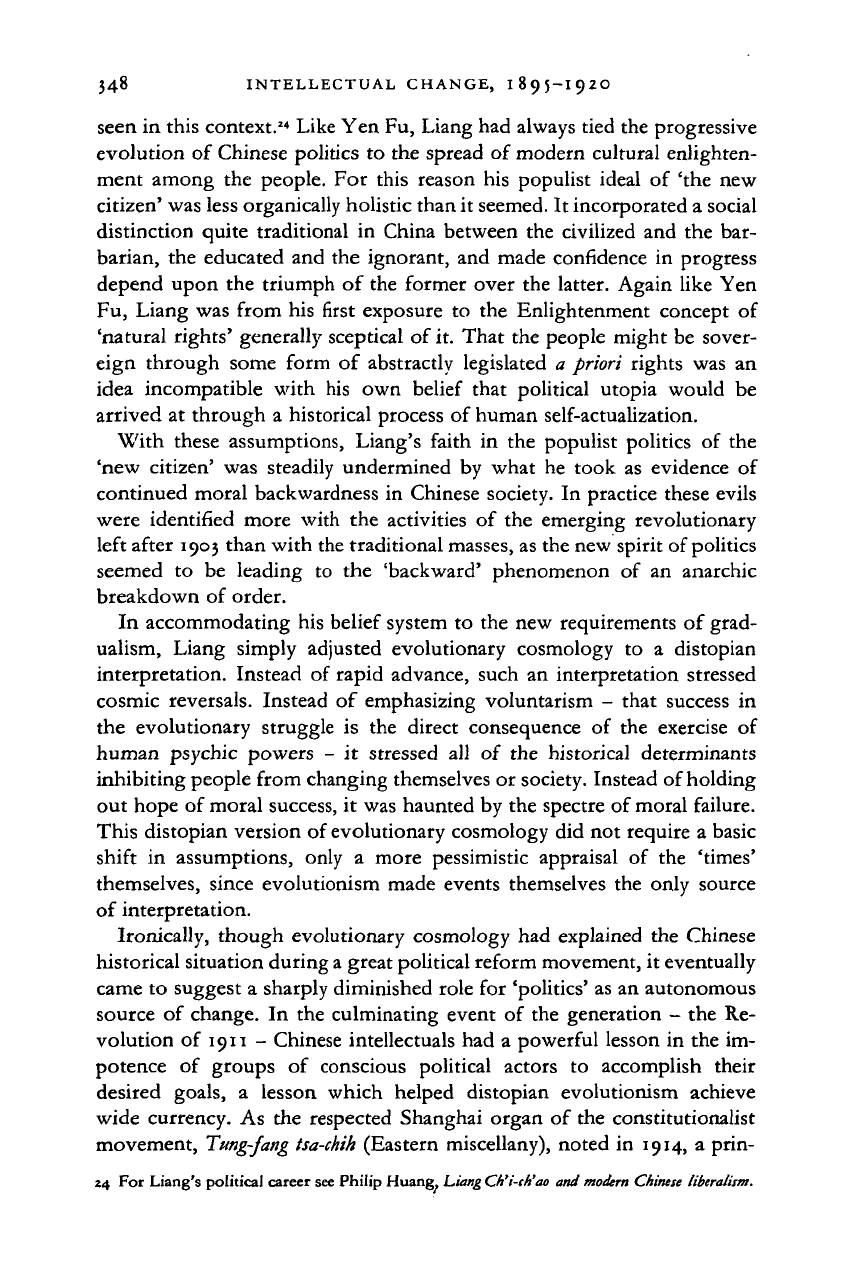
348 INTELLECTUAL CHANGE, 1895-192O
seen in this context.
24
Like Yen Fu, Liang had always tied the progressive
evolution
of
Chinese politics to the spread
of
modern cultural enlighten-
ment among
the
people. For this reason his populist ideal
of
'the new
citizen' was less organically holistic than it seemed. It incorporated a social
distinction quite traditional
in
China between the civilized and the bar-
barian, the educated and the ignorant, and made confidence
in
progress
depend upon the triumph
of
the former over the latter. Again like Yen
Fu, Liang was from his first exposure
to the
Enlightenment concept
of
'natural rights' generally sceptical of it. That the people might be sover-
eign through some form
of
abstractly legislated a priori rights was
an
idea incompatible with
his own
belief that political Utopia would
be
arrived
at
through
a
historical process of human self-actualization.
With these assumptions, Liang's faith
in the
populist politics
of
the
'new citizen' was steadily undermined
by
what
he
took
as
evidence
of
continued moral backwardness
in
Chinese society.
In
practice these evils
were identified more with the activities
of
the emerging revolutionary
left after 1903 than with the traditional masses, as the new spirit of politics
seemed
to be
leading
to the
'backward' phenomenon
of an
anarchic
breakdown
of
order.
In accommodating his belief system
to
the new requirements
of
grad-
ualism, Liang simply adjusted evolutionary cosmology
to a
distopian
interpretation. Instead
of
rapid advance, such
an
interpretation stressed
cosmic reversals. Instead
of
emphasizing voluntarism
-
that success
in
the evolutionary struggle
is the
direct consequence
of
the exercise
of
human psychic powers
- it
stressed
all of
the historical determinants
inhibiting people from changing themselves or society. Instead of holding
out hope of moral success,
it
was haunted by the spectre of moral failure.
This distopian version of evolutionary cosmology did not require
a
basic
shift
in
assumptions, only
a
more pessimistic appraisal
of the
'times'
themselves, since evolutionism made events themselves the only source
of interpretation.
Ironically, though evolutionary cosmology had explained the Chinese
historical situation during
a
great political reform movement, it eventually
came to suggest
a
sharply diminished role for 'politics' as an autonomous
source
of
change.
In
the culminating event
of
the generation
-
the Re-
volution
of
1911
-
Chinese intellectuals had
a
powerful lesson in the im-
potence
of
groups
of
conscious political actors
to
accomplish their
desired goals,
a
lesson which helped distopian evolutionism achieve
wide currency. As the respected Shanghai organ
of
the constitutionalist
movement,
Tung-fang tsa-chih
(Eastern miscellany), noted in 1914,
a
prin-
24 For Liang's political career see Philip Huang,, Liang
Ch'i-ch'ao
and
modern Chinese
liberalism.
Cambridge Histories Online © Cambridge University Press, 2008
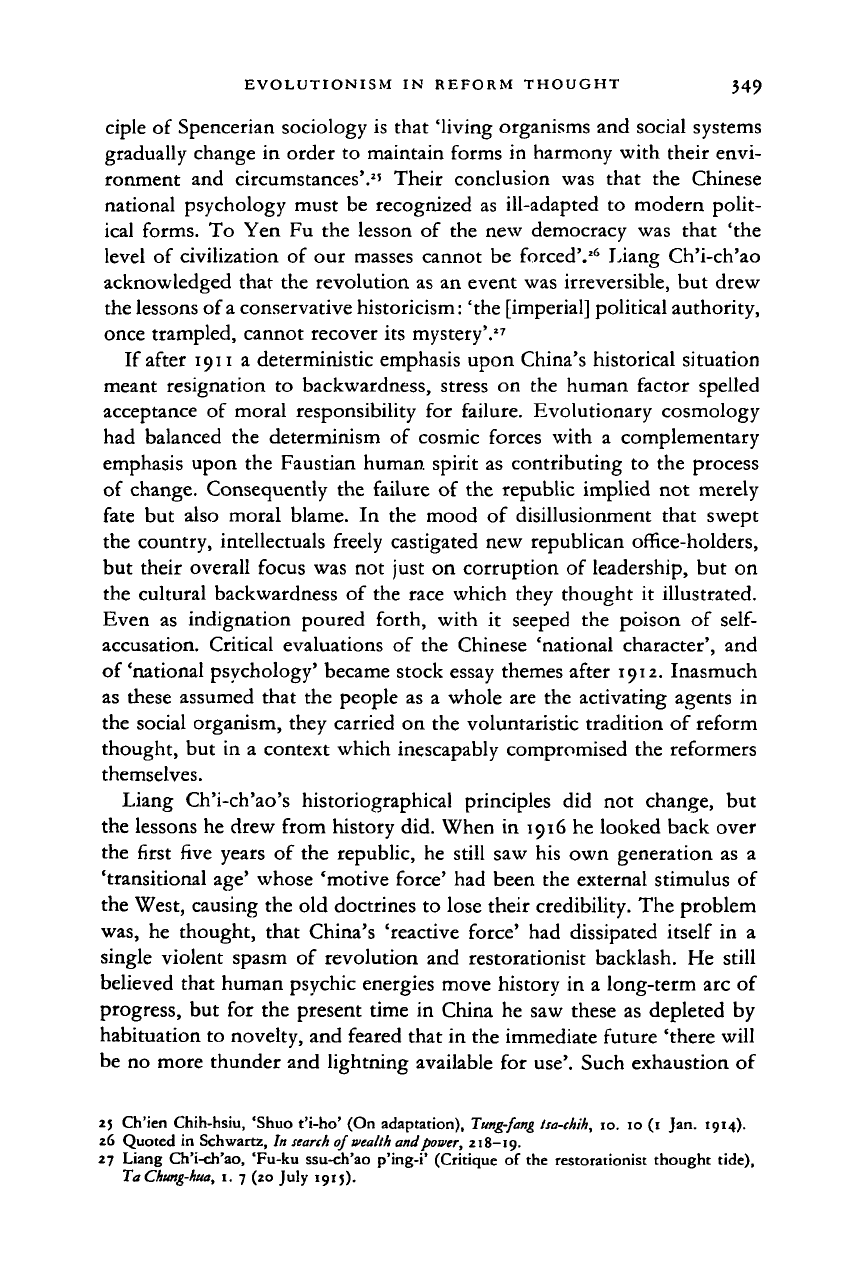
EVOLUTIONISM IN REFORM THOUGHT 349
ciple of Spencerian sociology is that 'living organisms and social systems
gradually change in order to maintain forms in harmony with their envi-
ronment and circumstances'.
2
' Their conclusion was that the Chinese
national psychology must be recognized as ill-adapted to modern polit-
ical forms. To Yen Fu the lesson of the new democracy was that 'the
level of civilization of our masses cannot be forced'.
26
Liang Ch'i-ch'ao
acknowledged that the revolution as an event was irreversible, but drew
the lessons of a conservative historicism: 'the [imperial] political authority,
once trampled, cannot recover its mystery'.
27
If after 1911 a deterministic emphasis upon China's historical situation
meant resignation to backwardness, stress on the human factor spelled
acceptance of moral responsibility for failure. Evolutionary cosmology
had balanced the determinism of cosmic forces with a complementary
emphasis upon the Faustian human spirit as contributing to the process
of change. Consequently the failure of the republic implied not merely
fate but also moral blame. In the mood of disillusionment that swept
the country, intellectuals freely castigated new republican office-holders,
but their overall focus was not just on corruption of leadership, but on
the cultural backwardness of the race which they thought it illustrated.
Even as indignation poured forth, with it seeped the poison of
self-
accusation. Critical evaluations of the Chinese 'national character', and
of'national psychology' became stock essay themes after 1912. Inasmuch
as these assumed that the people as a whole are the activating agents in
the social organism, they carried on the voluntaristic tradition of reform
thought, but in a context which inescapably compromised the reformers
themselves.
Liang Ch'i-ch'ao's historiographical principles did not change, but
the lessons he drew from history did. When in 1916 he looked back over
the first five years of the republic, he still saw his own generation as a
'transitional age' whose 'motive force' had been the external stimulus of
the West, causing the old doctrines to lose their credibility. The problem
was,
he thought, that China's 'reactive force' had dissipated itself in a
single violent spasm of revolution and restorationist backlash. He still
believed that human psychic energies move history in a long-term arc of
progress, but for the present time in China he saw these as depleted by
habituation to novelty, and feared that in the immediate future 'there will
be no more thunder and lightning available for use'. Such exhaustion of
25 Ch'ien Chih-hsiu, 'Shuo t'i-ho' (On adaptation),
Tung-fang
tsa-chih,
10. 10 (i Jan. 1914).
26 Quoted in Schwartz, In
search
0}
wealth
and power, 218-19.
27 Liang Ch'i-ch'ao, 'Fu-ku ssu-ch'ao p'ing-i' (Critique of the restorationist thought tide),
TaChung-hua,
1. 7 (20 July 1915).
Cambridge Histories Online © Cambridge University Press, 2008
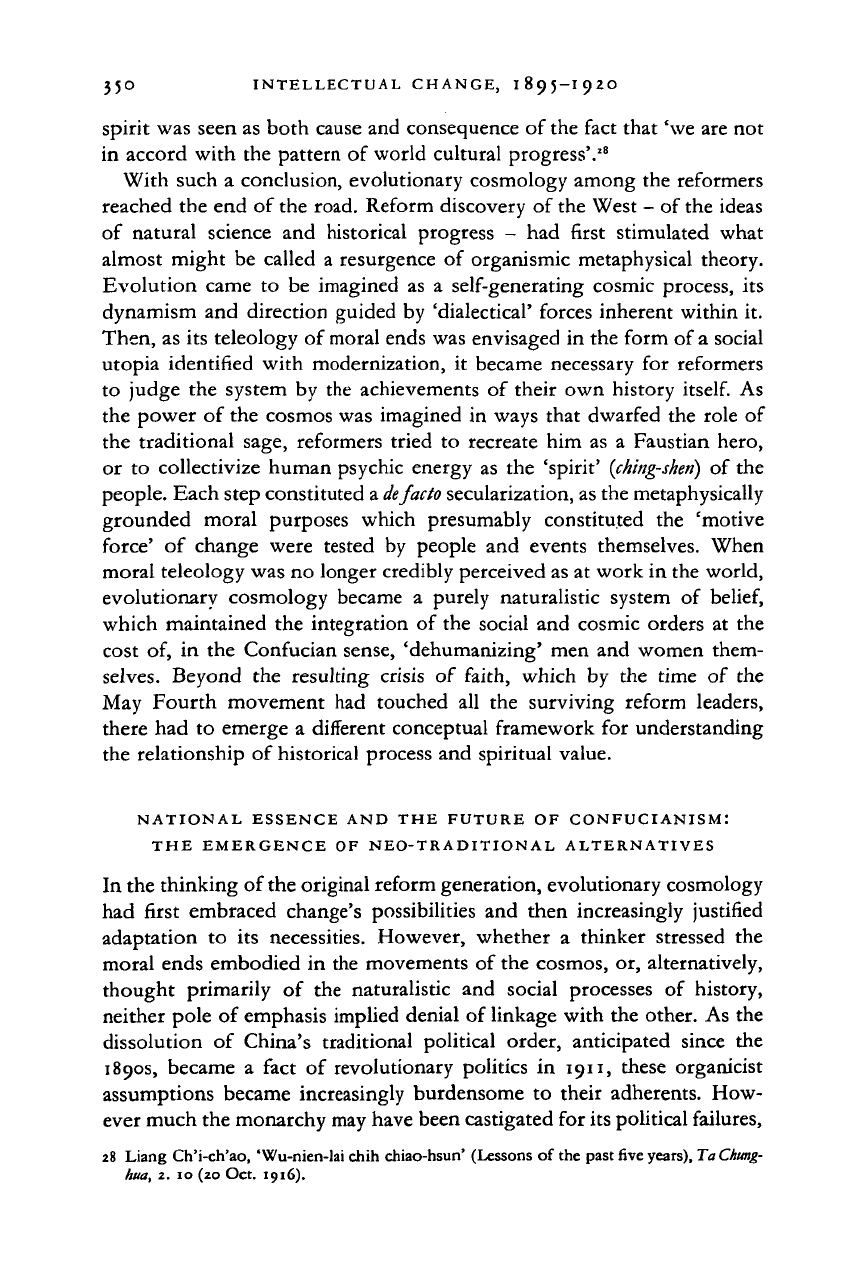
350 INTELLECTUAL CHANGE, 1895-I92O
spirit
was
seen
as
both cause
and
consequence
of
the fact that
'we are not
in accord with
the
pattern
of
world cultural progress'.
28
With such
a
conclusion, evolutionary cosmology among
the
reformers
reached
the end of
the road. Reform discovery
of
the West
- of
the ideas
of natural science
and
historical progress
- had
first stimulated what
almost might
be
called
a
resurgence
of
organismic metaphysical theory.
Evolution came
to be
imagined
as a
self-generating cosmic process,
its
dynamism
and
direction guided
by
'dialectical' forces inherent within
it.
Then,
as its
teleology
of
moral ends was envisaged
in the
form
of
a social
Utopia identified with modernization,
it
became necessary
for
reformers
to judge
the
system
by the
achievements
of
their
own
history
itself.
As
the power
of
the cosmos was imagined
in
ways that dwarfed
the
role
of
the traditional sage, reformers tried
to
recreate
him as a
Faustian hero,
or
to
collectivize human psychic energy
as the
'spirit'
(ching-sheri)
of the
people. Each step constituted a de facto secularization, as the metaphysically
grounded moral purposes which presumably constituted
the
'motive
force'
of
change were tested
by
people
and
events themselves. When
moral teleology was
no
longer credibly perceived as
at
work
in
the world,
evolutionary cosmology became
a
purely naturalistic system
of
belief,
which maintained
the
integration
of the
social
and
cosmic orders
at the
cost
of, in the
Confucian sense, 'dehumanizing'
men and
women them-
selves. Beyond
the
resulting crisis
of
faith, which
by the
time
of the
May Fourth movement
had
touched
all the
surviving reform leaders,
there
had to
emerge
a
different conceptual framework
for
understanding
the relationship
of
historical process
and
spiritual value.
NATIONAL ESSENCE AND THE FUTURE OF CONFUCIANISM:
THE EMERGENCE OF NEO-TRADITIONAL ALTERNATIVES
In the thinking
of
the original reform generation, evolutionary cosmology
had first embraced change's possibilities
and
then increasingly justified
adaptation
to its
necessities. However, whether
a
thinker stressed
the
moral ends embodied
in the
movements
of
the cosmos,
or,
alternatively,
thought primarily
of the
naturalistic
and
social processes
of
history,
neither pole
of
emphasis implied denial
of
linkage with
the
other.
As the
dissolution
of
China's traditional political order, anticipated since
the
1890s, became
a
fact
of
revolutionary politics
in
1911, these organicist
assumptions became increasingly burdensome
to
their adherents.
How-
ever much the monarchy may have been castigated
for
its political failures,
28 Liang Ch'i-ch'ao, 'Wu-nien-lai chih chiao-hsun' (Lessons
of
the past
five
years),
Ta
Chung-
hua,
2.
10 (zo Oct. 1916).
Cambridge Histories Online © Cambridge University Press, 2008
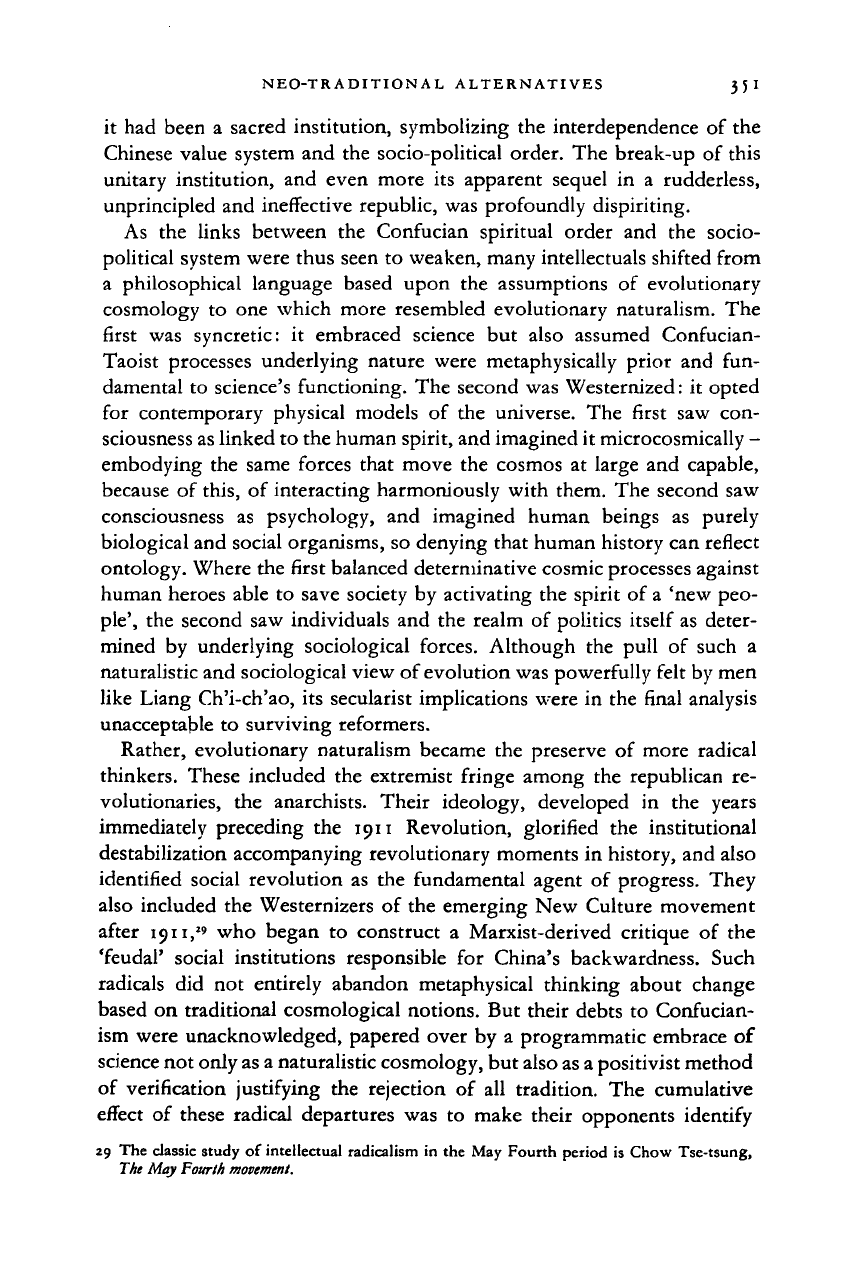
NEO-TRADITIONAL ALTERNATIVES 3
5
I
it
had
been
a
sacred institution, symbolizing
the
interdependence
of the
Chinese value system
and the
socio-political order.
The
break-up
of
this
unitary institution,
and
even more
its
apparent sequel
in a
rudderless,
unprincipled
and
ineffective republic,
was
profoundly dispiriting.
As
the
links between
the
Confucian spiritual order
and the
socio-
political system were thus seen
to
weaken, many intellectuals shifted from
a philosophical language based upon
the
assumptions
of
evolutionary
cosmology
to one
which more resembled evolutionary naturalism.
The
first was syncretic:
it
embraced science
but
also assumed Confucian-
Taoist processes underlying nature were metaphysically prior
and fun-
damental
to
science's functioning.
The
second was Westernized:
it
opted
for contemporary physical models
of the
universe.
The
first
saw con-
sciousness as linked to the human spirit, and imagined
it
microcosmically
-
embodying
the
same forces that move
the
cosmos
at
large
and
capable,
because
of
this,
of
interacting harmoniously with them.
The
second
saw
consciousness
as
psychology,
and
imagined human beings
as
purely
biological and social organisms,
so
denying that human history can reflect
ontology. Where
the
first balanced determinative cosmic processes against
human heroes able
to
save society
by
activating
the
spirit
of
a 'new peo-
ple',
the
second
saw
individuals
and the
realm
of
politics itself as deter-
mined
by
underlying sociological forces. Although
the
pull
of
such
a
naturalistic and sociological view
of
evolution was powerfully felt by men
like Liang Ch'i-ch'ao,
its
secularist implications were
in the
final analysis
unacceptable
to
surviving reformers.
Rather, evolutionary naturalism became
the
preserve
of
more radical
thinkers. These included
the
extremist fringe among
the
republican
re-
volutionaries,
the
anarchists. Their ideology, developed
in the
years
immediately preceding
the 1911
Revolution, glorified
the
institutional
destabilization accompanying revolutionary moments
in
history, and also
identified social revolution
as the
fundamental agent
of
progress. They
also included
the
Westernizers
of
the emerging
New
Culture movement
after
1911,
29
who
began
to
construct
a
Marxist-derived critique
of the
'feudal' social institutions responsible
for
China's backwardness. Such
radicals
did not
entirely abandon metaphysical thinking about change
based
on
traditional cosmological notions.
But
their debts
to
Confucian-
ism were unacknowledged, papered over
by a
programmatic embrace
of
science not only as a naturalistic cosmology, but also as a positivist method
of verification justifying
the
rejection
of all
tradition.
The
cumulative
effect
of
these radical departures
was to
make their opponents identify
29
The
classic study
of
intellectual radicalism
in the May
Fourth period
is
Chow Tse-tsung,
The
May
Fourth movement.
Cambridge Histories Online © Cambridge University Press, 2008
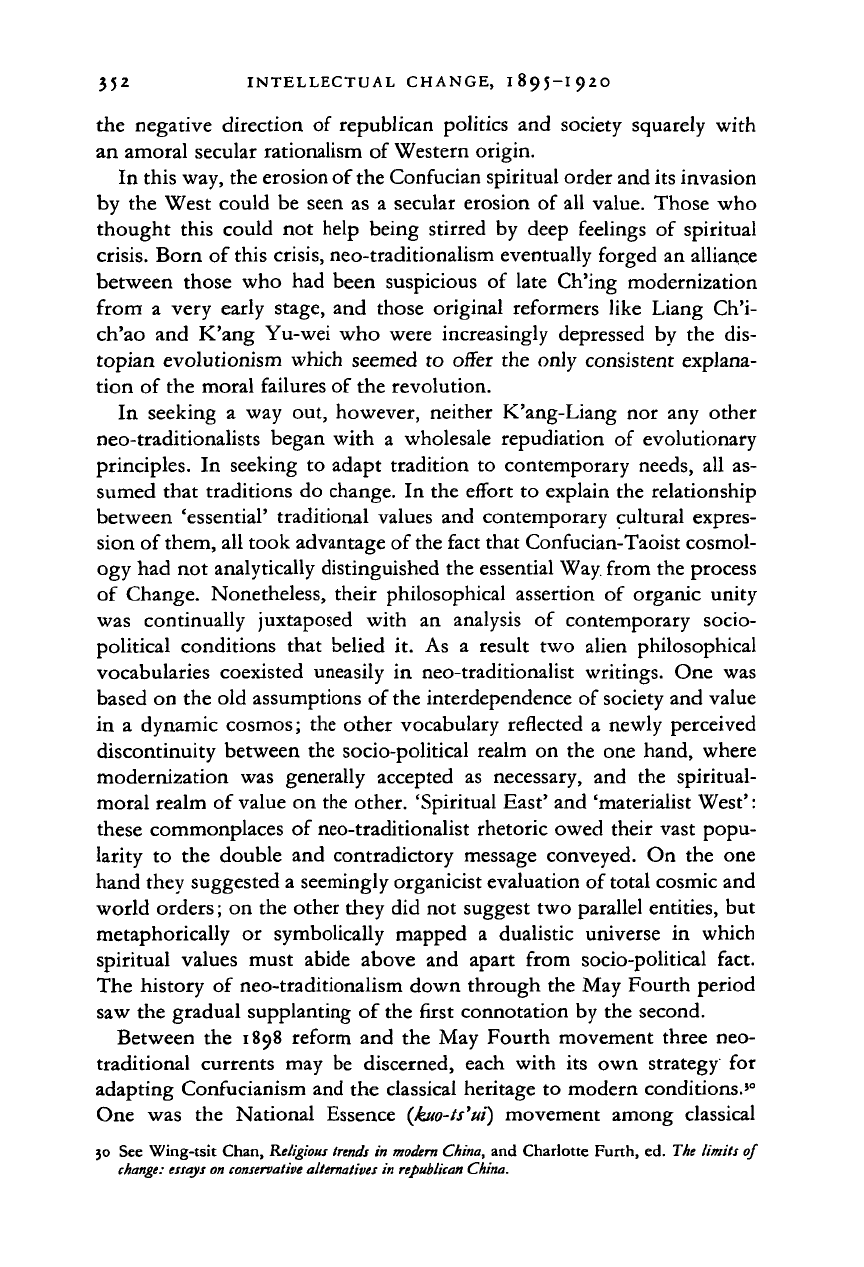
352 INTELLECTUAL CHANGE, 1895-I92O
the negative direction
of
republican politics
and
society squarely with
an amoral secular rationalism
of
Western origin.
In this way, the erosion
of
the Confucian spiritual order and its invasion
by
the
West could
be
seen
as a
secular erosion
of
all value. Those
who
thought this could
not
help being stirred
by
deep feelings
of
spiritual
crisis.
Born
of
this crisis, neo-traditionalism eventually forged
an
alliance
between those
who had
been suspicious
of
late Ch'ing modernization
from
a
very early stage,
and
those original reformers like Liang
Ch'i-
ch'ao
and
K'ang Yu-wei
who
were increasingly depressed
by the dis-
topian evolutionism which seemed
to
offer
the
only consistent explana-
tion
of
the moral failures
of
the revolution.
In seeking
a way out,
however, neither K'ang-Liang
nor any
other
neo-traditionalists began with
a
wholesale repudiation
of
evolutionary
principles.
In
seeking
to
adapt tradition
to
contemporary needs,
all as-
sumed that traditions
do
change.
In the
effort
to
explain
the
relationship
between 'essential' traditional values
and
contemporary cultural expres-
sion
of
them, all took advantage
of
the fact that Confucian-Taoist cosmol-
ogy had
not
analytically distinguished the essential Way. from the process
of Change. Nonetheless, their philosophical assertion
of
organic unity
was continually juxtaposed with
an
analysis
of
contemporary socio-
political conditions that belied
it. As a
result
two
alien philosophical
vocabularies coexisted uneasily
in
neo-traditionalist writings.
One was
based
on
the
old
assumptions
of
the interdependence
of
society and value
in
a
dynamic cosmos;
the
other vocabulary reflected
a
newly perceived
discontinuity between
the
socio-political realm
on the one
hand, where
modernization
was
generally accepted
as
necessary,
and the
spiritual-
moral realm
of
value
on
the other. 'Spiritual East'
and
'materialist West':
these commonplaces
of
neo-traditionalist rhetoric owed their vast popu-
larity
to the
double
and
contradictory message conveyed.
On the one
hand they suggested
a
seemingly organicist evaluation
of
total cosmic and
world orders;
on the
other they
did not
suggest two parallel entities,
but
metaphorically
or
symbolically mapped
a
dualistic universe
in
which
spiritual values must abide above
and
apart from socio-political fact.
The history
of
neo-traditionalism down through
the
May Fourth period
saw
the
gradual supplanting
of
the first connotation
by the
second.
Between
the 1898
reform
and the May
Fourth movement three
neo-
traditional currents
may be
discerned, each with
its own
strategy
for
adapting Confucianism and
the
classical heritage
to
modern conditions.
5
"
One
was the
National Essence
(Jkuo-ts'ui)
movement among classical
30
See
Wing-tsit Chan,
Religious trends
in
modern
China,
and
Charlotte Furth,
ed.
The limits of
change: essays on conservative alternatives
in
republican China.
Cambridge Histories Online © Cambridge University Press, 2008
